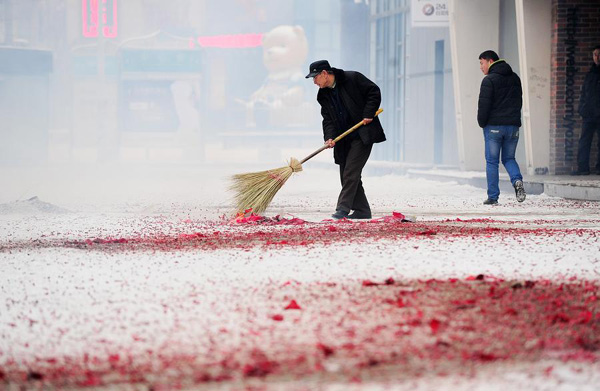
18 Feb, 2015
Beijing pollution levels projected to spike with New Year fireworks
Beijing, (China Daily) 2015-02-17 – When the fireworks light up the night to celebrate Lunar New Year in Beijing, air quality in the capital will get worse, possibly leading to three days of severe pollution, the municipal environmental watchdog said on Monday.
The weather from Wednesday to Friday is expected to be windless, which means air pollutants near the ground will not be dispersed, said Li Yunting, director in charge of air quality at the Beijing Environmental Monitoring Center.
 A resident cleans remains of firecrackers in Yinchuan, Ningxia Hui aotonomous region, Feb 7, 2014. [Photo/Xinhua] |
Those windless days correspond to the heaviest use of firecrackers. Lunar New Year, or Spring Festival, falls on Thursday.
“The fireworks will generate a huge amount of pollution in a short time, increasing the density of sulfur dioxide and PM2.5, the major airborne pollutants,” Li said. The windless weather will hold pollutants in the city for a longer time, making the air all the worse, she said. Air pollution may reach the top hazardous level, with the air quality index reaching 500 on Wednesday night as families begin to enjoy the tradition of setting off firecrackers, she said.
On Lunar New Year’s Eve in 2013, Beijing saw a rapid increase of PM2.5, airborne particles smaller than 2.5 microns in diameter that can penetrate the lungs and harm health. The concentration grew from 150 micrograms per cubic meter at midnight to 347 micrograms per cubic meter in one hour because of fireworks, according to the bureau.
If the fireworks are set off in huge volume, as they were last year, the air pollution in this week’s celebration will last five to six hours longer at the hazardous level, she said.
Li added that, with the exception of the three heavily polluted days this week, Beijing can expect good air quality during the holiday, which will last from Feb 18 to 24.
The Ministry of Environmental Protection required on Feb 3 all provinces and areas to implement fireworks restrictions, expanding forbidden areas and extending forbidden times, especially when severe air pollution covers the cities. In response, cities have made more stringent efforts to reduce the pollutants that come from fireworks.
For example, in Beijing, only 942 firecracker retail businesses were approved, down more than 100 from a year ago and the smallest number in the past decade, the Beijing Administration of Work Safety said.
Zhao Weiping, CEO of Panda Fireworks Co, told Securities Daily on Monday that sales of fireworks during this year’s holiday are estimated to go down by 30 percent year-on-year because of the restrictions.



Liked this article? Share it!